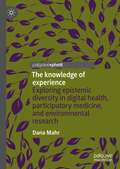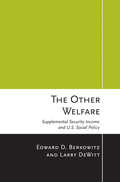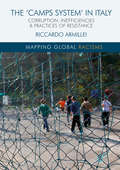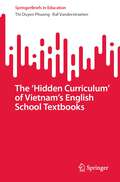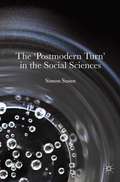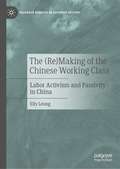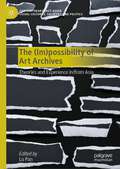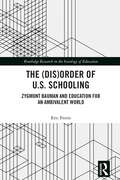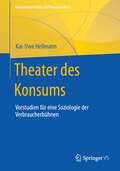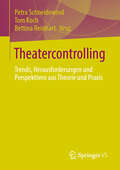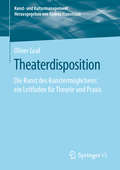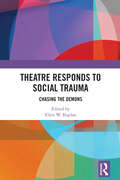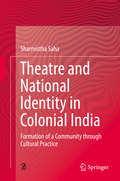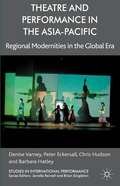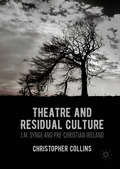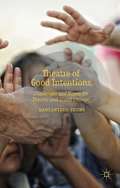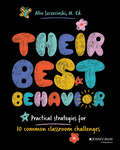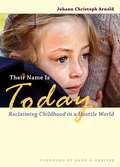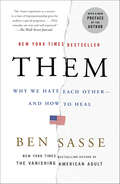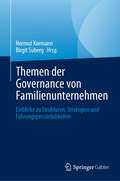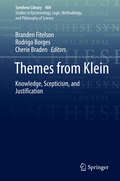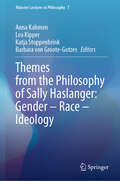- Table View
- List View
The knowledge of experience: Exploring epistemic diversity in digital health, participatory medicine, and environmental research
by Dana MahrThis book explores the role of social and epistemic diversity in science, technology, and medicine in the 21st century. It argues that most contemporary endeavours to democratize science are epistemically conservative. Using illustrative case studies, Dr Dana Mahr shows how epistemic diversity can contribute to a renewal of the production of scientific knowledge. Her exploration of online self-help cultures, radical feminist health movements, and grassroots environmentalism in Thailand emphasize that “experiential knowledge“ and “performativity“ are important epistemic strategies for marginalized social groups to critically engage with institutionalized knowledge.
The other welfare: supplemental security income and U.S. Social Policy
by Edward D. Berkowitz Larry DeWittThe Other Welfare offers the first comprehensive history of Supplemental Security Income (SSI), from its origins as part of President Nixon's daring social reform efforts to its pivotal role in the politics of the Clinton administration. Enacted into law in 1972, Supplemental Security Income (SSI) marked the culmination of liberal social and economic policies that began during the New Deal. The new program provided cash benefits to needy elderly, blind, and disabled individuals. Because of the complex character of SSI-marking both the high tide of the Great Society and the beginning of the retrenchment of the welfare state-it provides the perfect subject for assessing the development of the American state in the late twentieth century.SSI was launched with the hope of freeing welfare programs from social and political stigma; it instead became a source of controversy almost from its very start. Intended as a program that paid uniform benefits across the nation, it ended up replicating many of the state-by-state differences that characterized the American welfare state. Begun as a program intended to provide income for the elderly, SSI evolved into a program that served people with disabilities, becoming a primary source of financial aid for the de-institutionalized mentally ill and a principal support for children with disabilities.Written by a leading historian of America's welfare state and the former chief historian of the Social Security Administration, The Other Welfare illuminates the course of modern social policy. Using documents previously unavailable to researchers, the authors delve into SSI's transformation from the idealistic intentions of its founders to the realities of its performance in America's highly splintered political system. In telling this important and overlooked history, this book alters the conventional wisdom about the development of American social welfare policy.
The sources of social power
by Michael MannDistinguishing four sources of power in human societies - ideological, economic, military, and political - The Sources of Social Power traces their interrelations throughout human history. In this first volume, Michael Mann examines inter-relations between these elements from neolithic times, through ancient Near Eastern civilizations, the classical Mediterranean age, and medieval Europe, up to just before the Industrial Revolution in England. It offers explanations of the emergence of the state and social stratification; of city-states, militaristic empires, and the persistent interaction between them; of the world salvation religions; and of the particular dynamism of medieval and early modern Europe. It ends by generalizing about the nature of overall social development, the varying forms of social cohesion, and the role of classes and class struggle in history. First published in 1986, this new edition of volume 1 includes a new preface by the author examining the impact and legacy of the work.
The ‘Camps System’ in Italy: Corruption, Inefficiencies And Practices Of Resistance (Mapping Global Racisms)
by Riccardo ArmilleiThis book deals with the social exclusion of Romanies (‘Gypsies’) in Italy. Based on interviews with Romani individuals, institutional and Civil Society Organisations’ (CSOs) representatives, participant observation and a broad range of secondary sources, the volume focuses on the conditions of those living in Rome’s urban slums and on the recent implementation of the so-called ‘Emergenza Nomadi’ (Nomad Emergency). The enactment of this extraordinary measure concealed the existence of a long-established institutional tradition of racism and control directed at Romanies. It was not the result of a sudden, unexpected situation which required an immediate action, as the declaration of an ‘emergency’ might imply, but rather of a precise government strategy. By providing an investigation into the interactions between Romanies, local institutions and CSOs, this book will deliver a new perspective on the Romani issue by arguing that the ‘camp’ is not only a tool for institutional control and segregation, but also for ‘resistance’, as well as a huge business in which everyone plays their part.
The ‘Hidden Curriculum’ of Vietnam’s English School Textbooks (SpringerBriefs in Education)
by Raf Vanderstraeten Thi Duyen PhuongThis book analyzes the basic ideas and premises underlying the English textbooks used at the higher secondary school level in Vietnam from the 1980s to the present, from a sociological perspective. The dataset, upon which this book builds, consists of a collection of 18 textbooks, which belong to five sets of locally developed English textbooks for grade 10 to grade 12 students. These series were used in all public schools from the mid-1980s to the present. During this period, schooling expanded rapidly in Vietnam, while English also gained increasing prominence within the school system.This book examines the curricular content of these textbooks and presents a long-term analysis of the ‘hidden’ curricular content in light of Vietnam’s recent history and its government’s concerns about national identity.
The ‘Postmodern Turn’ in the Social Sciences
by Simon SusenSimon Susen examines the impact of the 'postmodern turn' on the contemporary social sciences. On the basis of an innovative five-dimensional approach, this study provides a systematic, comprehensive, and critical account of the legacy of the 'postmodern turn', notably in terms of its continuing relevance in the twenty-first century.
The: Labor Activism and Passivity in China (Palgrave Debates in Business History)
by Elly LeungThis book engages with Foucault’s theoretical works to understand the (re-) making of the working-class in China. In so doing, the author applies Foucault’s genealogical (historicalization) method to explore the ways the Chinese Communist Party (CCP) develop Chinese governmentality (or government of mentalities) among everyday workers in its thought management system. Through the investigation of the key events in Chinese history, she presents how China’s stable political party is sustained through the CCP’s ability to retain, update and incorporate many Confucian discourses into its contemporary form of thought management system using social networks, such as families and schools, to continuously (re-) shape workers’ consciousness into one that maintains their docility. This book will bring a new voice to the debate of Chinese working-class politics and labour movements. It will serve as a gateway to comprehensive knowledge about China for students and academics with interests in Chinese employment relations, Chinese politics, labourist activist culture, and social movements.
The: Theories and Experience in/from Asia (Contemporary East Asian Visual Cultures, Societies and Politics)
by Lu PanThis edited volume aims to fill the gap in the research, juxtaposition, and focused discussions in the existing literature on art archives in Asia. Most of the archives included in the book are independent and initiated by individuals, folk groups, or non-profit organizations. In this book, one can trace the dynamics and self-generative capacity in this particular historical and cultural milieu through these “alternative” archives and through the practices of artists and curators who apply their specific understanding of archive to their works. Many chapters resonate with each other in that they capture the experiences shared by many places in Asia. Those experiences could have resulted from the encounter with the Western idea of archive, the influence of the colonial experience, or a memory crisis triggered by the rapid transformation of media, and may serve as a basis for producing archive theories in/from Asia. The book provides an opportunity for the archives in Asia and those who work around them to recognize one another, understand what their colleagues in archival work do, how they do it and what else there is for them to do.
The: Zygmunt Bauman and Education for an Ambivalent World (Routledge Research in the Sociology of Education)
by Eric FerrisThis book critically interrogates the function of schooling in the United States of America using the writings of sociologist Zygmunt Bauman. Asking whether the function is to produce citizens, workers, a combination of the two, or something altogether different, it argues that the designs of schooling are part of a carefully crafted ordering, illustrated via an analysis of the ways in which schooling introduces students to various forms of coercion and seduction that socialize students in particular ways: ways that support an order. By engaging with the prolific and insightful works of one of the most prominent social thinkers of the 21st century, this book considers schooling and its contributions to order. Be they solid or liquid modern ordering mechanisms, ordering through repression and seduction, or supporting ordering through the creation of boundaries separating an “orderly inside” from its “disorderly outside,” schools imperfectly support the construction of order and in doing so, privilege some representations and individuals over others. To order is to harness ambivalence and steer it in directions that privilege the “in” group at the expense of the “out” group; and schools, from the curriculum they teach to the values and ideas they promote, are desirable captive marketplaces instrumental in steering this ambivalence. The author ultimately suggests that the function of schools, whether recognized or not, are not so much to educate students to be free thinkers, but rather to be orderly cogs in a particular functional social machine. As such, the book will be of interest to faculty, scholars, and postgraduate-level students with interests in the sociology of education, schooling, sociology, and social theory.
Theater des Konsums: Vorstudien für eine Soziologie der Verbraucherbühnen (Konsumsoziologie und Massenkultur)
by Kai-Uwe HellmannDiese Aufsatzsammlung beschäftigt sich vornehmlich mit der Frage, unter welchen Bedingungen die Erfahrung gemacht wird, dass typische Verbraucherrollen, ob Käufer-, Kunden- oder Konsumentenrolle, in kommerziell organisierten Kauf- oder Konsumsituationen unangefochten ausgespielt werden können und den Interaktionsverlauf strukturell wie prozessual wesentlich bestimmen. Denn keineswegs überall, wo Kauf- oder Verbrauchsakte empirisch stattfinden, definieren diese die jeweilige Situation auch in Gänze, so dass nahezu sämtliche Aufmerksamkeit durch die damit verbundenen, kommerziell orientierten Erlebnisse und Handlungen physisch, psychisch und sozial okkupiert wird, bei weitgehender Neutralisierung aller sonstigen Rollenverpflichtungen. Immerhin müssen sich Verbraucherrollen angesichts einer funktional differenzierten Gesellschaft, in der das ständige Management einer Vielzahl von Publikumsrollen unausweichlich ist, die knapp bemessene Aufmerksamkeitsspanne mit zahlreichen weiteren Publikumsrollen teilen. Im Kern geht es bei diesem Konzept darum, kommerziell organisierte Settings zu identifizieren, die wie Gerichte, Kirchen, Klöster, Krankenhäuser, Schulen, Sportstadien usw., bei denen die jeweiligen Inklusionseffekte eine temporäre Transformation der Personen in Folge der Übernahme entsprechender Publikumsrollen auslösen können – nicht zu vergessen temporäre Transformationseffekte im Zuge der aktiven Partizipation an Zeugenvernehmungen, Gottesdiensten, Fastenritualen, Krankenbehandlungen, Unterrichtseinheiten, Sportwettbewerben usw. – funktional Äquivalentes bei der Ausübung von Verbraucherrollen bewerkstelligen. Als prototypisch für solche kommerziell organisierten Settings, hier verkürzt als ‚Verbraucherbühnen‘ bezeichnet, werden in der Konsum- und Serviceforschung übrigens die Freizeitparks der Walt Disney Company behandelt. Dabei erfordert die Erforschung solcher Verbraucherbühnen eine Kombination von Rollen-, Organisations- und Interaktionsanalysen, zudem eine kultur- und mediensoziologische Perspektive, wie sie für das Studium von Verbraucherleitbildern empfehlenswert erscheint. Denn wie schon die soziologische Rollentheorie festgestellt hatte, orientieren sich Rollenspiele immer an gewissen Images, Rationalitätsfiktionen, Stereotypen, d. h. Normen des Rollenverhaltens, die Richtung und Reichweite typischen Rollenverhaltens vorschreiben und anleiten.
Theatercontrolling: Trends, Herausforderungen und Perspektiven aus Theorie und Praxis
by Tom Koch Petra Schneidewind Bettina ReinhartDas Führen von Theatern und Orchestern ist heute möglicherweise so komplex wie nie zuvor. Die Auswirkungen von Corona-Krise, Inflation, Fachkräftemangel, Nachhaltigkeitsbestrebungen und viele weitere Faktoren stellen die Bühnenbetriebe vor enorme Herausforderungen. Das Controlling mit der zentralen Funktion der Zielsteuerung muss sich diesen Herausforderungen nicht nur reaktiv stellen, sondern neue, auch kreative und zukunftsweisende Lösungen finden. Es gilt, sich proaktiv auf die Herausforderungen der Zukunft einzustellen und strategisch zu positionieren. Anlässlich des zehnjährigen Bestehens des „Forum Theatercontrolling“ greifen Autor*innen aus Theorie und Praxis aktuelle Themen auf, anhand derer sie die Handlungsfelder und Potenziale für ein zukunftsorientiertes Theatercontrolling diskutieren. Dazu gehören neben an Bedeutung gewinnenden Aufgabenfeldern wie Nachhaltigkeits-, Risiko-, Personal- oder Marketingcontrolling auch methodische Fragen wie Agilität oder Digitalisierung im Controlling. Nicht zuletzt werden personelle Themen wie die strategische Rolle von Controller*innen, Generationenwechsel und Nachwuchskräfte oder lebenslanges Lernen behandelt.
Theaterdisposition: Die Kunst des Kunstermöglichens: ein Leitfaden für Theorie und Praxis (Kunst- und Kulturmanagement)
by Oliver GrafDas vorliegende praxisorientierte Buch erörtert die Grundlagen der Theaterdisposition mit Blick auf die für diese Tätigkeit unabdingbaren rechtlichen und tariflichen Voraussetzungen und auf die schließlich in der Praxis angewandte Umsetzung. Der Ablauf der einzelnen Produktionen, der strukturelle Aufbau der Theaterdisposition, ihre Entstehung und das Zusammenspiel der äußeren Einflüsse werden detailliert erläutert. Die relevanten Gesetzestexte, von denen jede_r Disponent_in Kenntnis haben sollte, die aktuellen Tarifverträge, Interessensverbände und mögliche Software-Lösungen werden vorgestellt. Anhand von konkreten Beispielen wird die Entwicklung einer Theaterdisposition exemplarisch und logisch nachvollziehbar dargestellt. Praxiserfahrungen von Theaterdisponent_innen und Einblicke in den Alltag eines künstlerischen Betriebsbüros gewähren einen Blick hinter die Kulissen. Ein Wörterverzeichnis gibt eine Übersicht über die momentan gebräuchlichen Fachausdrücke der zu disponierenden Inhalte, während eine Auflistung und Auswertung der für die Theaterdisposition grundlegenden Paragrafen aus Tarifverträgen und Gesetzestexten das Buch abrundet. Das Buch richtet sich an Kulturmanager_innen, Theaterdisponent_innen, Künstler_innen und Beschäftigte an Theatern, es richtet sich sowohl an Profis als auch an Studierende, Auszubildende und an theateraffines Publikum.
Theatre Responds to Social Trauma: Chasing the Demons (Routledge Series in Equity, Diversity, and Inclusion in Theatre and Performance)
by Ellen W. KaplanThis book is a collection of chapters by playwrights, directors, devisers, scholars, and educators whose praxis involves representing, theorizing, and performing social trauma.Chapters explore how psychic catastrophes and ruptures are often embedded in social systems of oppression and forged in zones of conflict within and across national borders. Through multiple lenses and diverse approaches, the authors examine the connections between collective trauma, social identity, and personal struggle. We look at the generational transmission of trauma, socially induced pathologies, and societal re-inscriptions of trauma, from mass incarceration to war-induced psychoses, from gendered violence through racist practices. Collective trauma may shape, protect, and preserve group identity, promoting a sense of cohesion and meaning, even as it shakes individuals through pain. Engaging with communities under significant stress through artistic practice offers a path towards reconstructing the meaning(s) of social trauma, making sense of the past, understanding the present, and re-visioning the future.The chapters combine theoretical and practical work, exploring the conceptual foundations and the artists’ processes as they interrogate the intersections of personal grief and communal mourning, through drama, poetry, and embodied performance.
Theatre and National Identity in Colonial India: Formation Of A Community Through Cultural Practice
by Sharmistha SahaThis book critically engages with the study of theatre and performance in colonial India, and relates it with colonial (and postcolonial) discussions on experience, freedom, institution-building, modernity, nation/subject not only as concepts but also as philosophical queries. It opens up with the discourse around ‘Indian theatre’ that was started by the orientalists in the late 18th century, and which continued till much later. The study specifically focuses on the two major urban centres of colonial India: Bombay and Calcutta of the 19th and early 20th centuries. It discusses different cultural practices in colonial India, including the initiation of ‘Indian theatre’ practices, which resulted in many forms of colonial-native ‘theatre’ by the 19th century; the challenges to this dominant discourse from the ‘swadeshi jatra’ (national jatra/theatre) in Bengal, which drew upon earlier folk and religious traditions and was used as a tool by the nationalist movement; and the Indian People’s Theatre Association (IPTA) that functioned from Bombay around the 1940s, which focused on the creation of one national subject – that of the ‘Indian’. The author contextualizes the relevance of the concept of ‘Indian theatre’ in today’s political atmosphere. She also critically analyses the post-Independence Drama Seminar organized by the Sangeet Natak Akademi in 1956 and its relevance to the subsequent organization of ‘Indian theatre’. Many theatre personalities who emerged as faces of smaller theatre committees were part of the seminar which envisioned a national cultural body. This book is an important contribution to the field and is of interest to researchers and students of cultural studies, especially Theatre and Performance Studies, and South Asian Studies.
Theatre and Performance in the Asia-Pacific
by Chris Hudson Peter Eckersall Denise Varney Barbara HatleyTheatre and Performance in the Asia-Pacific is an innovative study of contemporary theatre and performance within the framework of modernity in the Asia-Pacific. It is an analysis of the theatrical imaginative as it manifests in theatre and performance in Australia, Indonesia, Japan and Singapore.
Theatre and Residual Culture: J.M. Synge and Pre-Christian Ireland
by Christopher CollinsThis book considers the cultural residue from pre-Christian Ireland in Synge’s plays and performances. By dramatising a residual culture in front of a predominantly modern and political Irish Catholic middle class audience, the book argues that Synge attempted to offer an alternative understanding of what it meant to be “modern” at the beginning of the twentieth century. The book draws extensively on Synge’s archive to demonstrate how pre-Christian residual culture informed not just how he wrote and staged pre-Christian beliefs, but also how he thought about an older, almost forgotten culture that Catholic Ireland desperately wanted to forget. Each of Synge’s plays is considered in an individual chapter, and they identify how Synge’s dramaturgy was informed by pre-Christian beliefs of animism, pantheism, folklore, superstition and magical ritual.
Theatre of Good Intentions
by Dani Snyder-YoungTheatre of Good Intentions examines limitations of theatre in the creation of social and political change. This book looks at some of the reasons why achieving such goals is hard; examining what theatre can and can't do. It examines a range of applied and political theatre case studies, focusing on theatre's impact on participants and spectators.
Their Best Behavior: Practical Strategies for 10 Common Classroom Challenges
by Allie SzczecinskiFind peace in the classroom with practical strategies for managing student behavior challenges In Their Best Behavior: Practical Strategies for 10 Common Classroom Challenges, seasoned educator Allie Szczecinski presents a lifeline for teachers overwhelmed by disruptive classroom behavior. The book addresses common problems and offers concrete, actionable strategies based on special education principles to manage student behavior effectively. With examples drawn from real-life classroom scenarios, Szczecinski illustrates how to diffuse disruptions and foster an environment conducive to learning. This invaluable guide transcends typical behavior management tactics by focusing on child-affirming and teacher-centric approaches. From tackling common issues like backtalk and aggression to handling work refusal and disengagement, Their Best Behavior equips you with the tools you need to restore calm and order to your classrooms. Inside the book: Gain insights into managing the ten most common elementary classroom behavior challenges Learn techniques backed by special education principles for a wide range of elementary settings Discover strategies that go beyond punitive measures to create a supportive and effective classroom environment Their Best Behavior is an essential read for elementary school teachers seeking support and strategies to manage challenging classroom behavior. Special education teachers, school leaders, and educators in need of practical solutions will find this book an instrumental resource in their professional development journey, helping them to foster a positive and productive learning atmosphere.
Their Name Is Today: Reclaiming Childhood In A Hostile World
by Johann Christoph Arnold Mark ShriverThere's hope for childhood. Despite a perfect storm of hostile forces that are robbing children of a healthy childhood, courageous parents and teachers who know what's best for children are turning the tide. Johann Christoph Arnold, whose books on education, parenting, and relationships have helped more than a million readers through life's challenges, draws on the stories and voices of parents and educators on the ground, and a wealth of personal experience. He surveys the drastic changes in the lives of children, but also the groundswell of grassroots advocacy and action that he believes will lead to the triumph of common sense and time-tested wisdom. Arnold takes on technology, standardized testing, overstimulation, academic pressure, marketing to children, over-diagnosis and much more, calling on everyone who loves children to combat these threats to childhood and find creative ways to help children flourish. Every parent, teacher, and childcare provider has the power to make a difference, by giving children time to play, access to nature, and personal attention, and most of all, by defending their right to remain children.
Them: Why We Hate Each Other—and How to Heal
by Ben SasseThis New York Times bestseller “argues that Americans are richer, more informed and ‘connected’ than ever—and unhappier, more isolated and less fulfilled” (George Will, The Washington Post).Something is wrong. We all know it.American life expectancy is declining. Birth rates are dropping. Nearly half of us think the other political party isn’t just wrong; they’re evil. We’re the richest country in history, but we’ve never been more pessimistic. What’s causing the despair? In Them, former US senator Ben Sasse argues that, contrary to conventional wisdom, our crisis isn’t really about politics. It’s that we’re so lonely we can’t see straight—and it bubbles out as anger.Local communities are collapsing. Across the nation, little leagues and Rotary clubs are dwindling, and in all likelihood, we don’t know the neighbor two doors down. Work offers less security, few lifelong coworkers, shallow purpose. Stable families and enduring friendships—life’s fundamental pillars—are in statistical freefall. As a result, we rally against common enemies so we can feel part of a team. Foreign adversaries use technology to exploit these toxic divisions by sowing misinformation and mistrust, to confuse us, exhaust us, make us angry—and thereby make us weaker.Reversing our decline requires something radical: a rediscovery of real places and human-to-human relationships. Even as technology nudges us to become rootless, Sasse shows how only a recovery of rootedness can heal our lonely souls. America wants you to be happy, but more urgently, America needs you to love your neighbor and connect with your community. Fixing what’s wrong with the country depends on it.“Sasse is highly attuned to the cultural sources of our current discontents and dysfunctions. . . . an attempt to diagnose and repair what has led us to this moment of spittle-flecked rage. . . . a step toward healing a hurting nation.” —National Review“Perhaps at last we have a politician capable of writing a good book rather than having a dull one written for him.” —The Wall Street Journal“Unpretentious, thoughtful, and at times, quite funny . . . his arguments are worth reading—as are his warnings about what our country might become.” —NPR
Themen der Governance von Familienunternehmen: Einblicke zu Strukturen, Strategien und Führungspersönlichkeiten
by Hermut Kormann Birgit SubergDieses Buch konzentriert sich auf die Rolle des Beirats oder ähnlicher Governance-Gremien in Familienunternehmen und speziell auf Prozesse und Themen von strategischer Bedeutung. Es umfasst alle relevanten Themen, die regelmäßig behandelt werden müssen, wie Strategieentwicklung, Finanzmanagement und Führung. Zu jedem Thema werden die Vor- und Nachteile herausgearbeitet. Dies ist eines der wenigen Bücher, das sich mit Familienunternehmen befasst, von den Governance-Systemen bis hin zur Rolle der Führungskräfte. Die von den Autoren sorgfältig gesammelten Beispiele und die eingehende Diskussion der Themen bieten dem Leser wertvolle Einblicke, um die Wirksamkeit der Unternehmensführung zu bereichern.
Themenkarrieren in der Wissenschaft: Die Entstehung der Themen Stadtschrumpfung und Klimawandel in der Raumforschung (Organization & Public Management)
by Andreas GravertDiese Open-Access-Publikation ist ein Plädoyer, das Verständnis von Themenkarrieren als integralen Bestandteil der Wissenschaft zu vertiefen und für die Reflexion wissenschaftlicher und planerischer Praxis zu nutzen.Welchen Gegenständen die Wissenschaft besondere Aufmerksamkeit beimisst, unterliegt einem dynamischen Wandel. Einige Themen, die lange Zeit Desinteresse und Ablehnung hervorriefen, rücken schlagartig in den Fokus um anschließend wieder abnehmende Aufmerksamkeit zu verzeichnen. Weder die Ursache noch der Zeitraum der anfänglichen Ignoranz, des abrupten Durchbruchs oder der anschließenden Ermüdung kann jedoch aus „rein wissenschaftlichen“ bzw. vermeintlich „objektiven“ Selektionskriterien erklärt werden. Wie also entstehen Themen in der Wissenschaft?Anhand der Themenkarrieren Schrumpfende Städte und Klimawandel wird untersucht, wie Aufmerksamkeit für ein Thema entsteht, welche sozialen Mechanismen dem Themenverlauf zugrunde liegen und welche Auswirkungen Themenkarrieren auf die planungswissenschaftliche Disziplin haben. Hierbei werden quantitative Methoden der Bibliometrie und der Netzwerkanalyse mit qualitativen Methoden der empirischen Sozialforschung in einer institutionalistischen Perspektive vereint.
Themes from Klein: Knowledge, Scepticism, and Justification (Synthese Library #404)
by Branden Fitelson Rodrigo Borges Cherie BradenThis volume features more than fifteen essays written in honor of Peter D. Klein. It explores the work and legacy of this prominent philosopher, who has had and continues to have a tremendous influence in the development of epistemology. The essays reflect the breadth and depth of Klein's work. They engage directly with his views and with the views of his interlocutors. In addition, a comprehensive introduction discusses the overall impact of Klein's philosophical work. It also explains how each of the essays in the book fits within that legacy. Coverage includes such topics as a knowledge-first account of defeasible reasoning, felicitous falsehoods, the possibility of foundationalist justification, the many formal faces of defeat, radical scepticism, and more. Overall, the book provides readers with an overview of Klein’s contributions to epistemology, his importance to twentieth and twenty-first-century philosophy, and a survey of his philosophical ideas and accomplishments. It's not only a celebration of the work of an important philosopher. It also offers readers an insightful journey into the nature of knowledge, scepticism, and justification.
Themes from Klein: Knowledge, Scepticism, and Justification (Synthese Library #404)
by Branden Fitelson Rodrigo Borges Cherie BradenThis volume features more than fifteen essays written in honor of Peter D. Klein. It explores the work and legacy of this prominent philosopher, who has had and continues to have a tremendous influence in the development of epistemology. The essays reflect the breadth and depth of Klein's work. They engage directly with his views and with the views of his interlocutors. In addition, a comprehensive introduction discusses the overall impact of Klein's philosophical work. It also explains how each of the essays in the book fits within that legacy. Coverage includes such topics as a knowledge-first account of defeasible reasoning, felicitous falsehoods, the possibility of foundationalist justification, the many formal faces of defeat, radical scepticism, and more. Overall, the book provides readers with an overview of Klein’s contributions to epistemology, his importance to twentieth and twenty-first-century philosophy, and a survey of his philosophical ideas and accomplishments. It's not only a celebration of the work of an important philosopher. It also offers readers an insightful journey into the nature of knowledge, scepticism, and justification.
Themes from the Philosophy of Sally Haslanger: Gender – Race – Ideology (Münster Lectures in Philosophy #7)
by Anna Kahmen Barbara von Groote-Gotzes Lea Kipper Katja StoppenbrinkThis book offers a critical discussion of Sally Haslanger's philosophical oeuvre. Published on the occasion of the annual Münster Lectures in Philosophy held by Prof. Haslanger in the winter of 2019, it covers both her prominent work on the themes of gender, race, and ideology, as well as her research on social practices and social structures. Conceptual, methodological, practical as well as normative approaches are pursued to more closely understand Sally Haslanger’s claims, arguments, and discursive goals. The direct correspondence between Sally Haslanger and her interlocutors makes this a very unique book suitable for both advanced scholars as well as graduate students.
